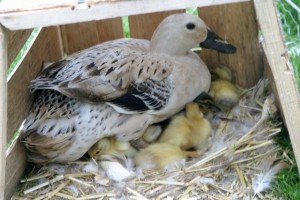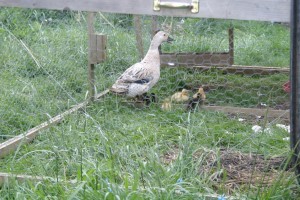I love natural nesting because it lets the birds do the work–they do a much better job than I do.
About 2 weeks ago, the first of our broody ducks produced a nice hatch. I had kept her in one of the goose pens, under the protective umbrella of the “watch gander” as she sat for 28 days on her 9 eggs. The gander couldn’t care less about protecting the duck, but I put the duck’s nest box right nest to the goose’s nest, so he didn’t have a choice.
Before the ducks start sitting, I collect the excess eggs to keep the count down to about 8-11 per nest. A bird can cover up to 12, but there’s often one or two more that come after she’s on the nest full time. Leaving a whole clutch of eggs is a good way to make a duck go broody. It hasn’t failed me yet, although sometimes it takes a week or two before she get’s the idea of what she’s supposed to do next.
I make a note on the calendar for when a bird starts sitting, and 2 weeks later I’ll candle the eggs with a flashlight at night. I pull out any infertile or otherwise dead ones to make a little more room in the nest.
For the first few days after they hatch, the ducklings stay real close to mom. After that, they get hungry and start to go out foraging. The problem is the ducklings fit through any hole that’s larger than 1-1/2 inches across. This means they are foraging all over the place while mom’s protection is stuck on the wrong side of the fence. All 8 ducklings made it through day 7, and then one disappeared. On day 9, Samuel and I saw a crow fly away with another duckling, so we immediately moved the remaining little ones into a portable pen. They don’t get to forage through as much grass this way, but it’s better than losing them all to crows.
In a couple more weeks these little ones will have grown enough so the fence will hold them in and the crows won’t bother them anymore. Until then, I bring them a shovel full of worm-filled compost every morning to make up for the bugs they aren’t getting elsewhere.


